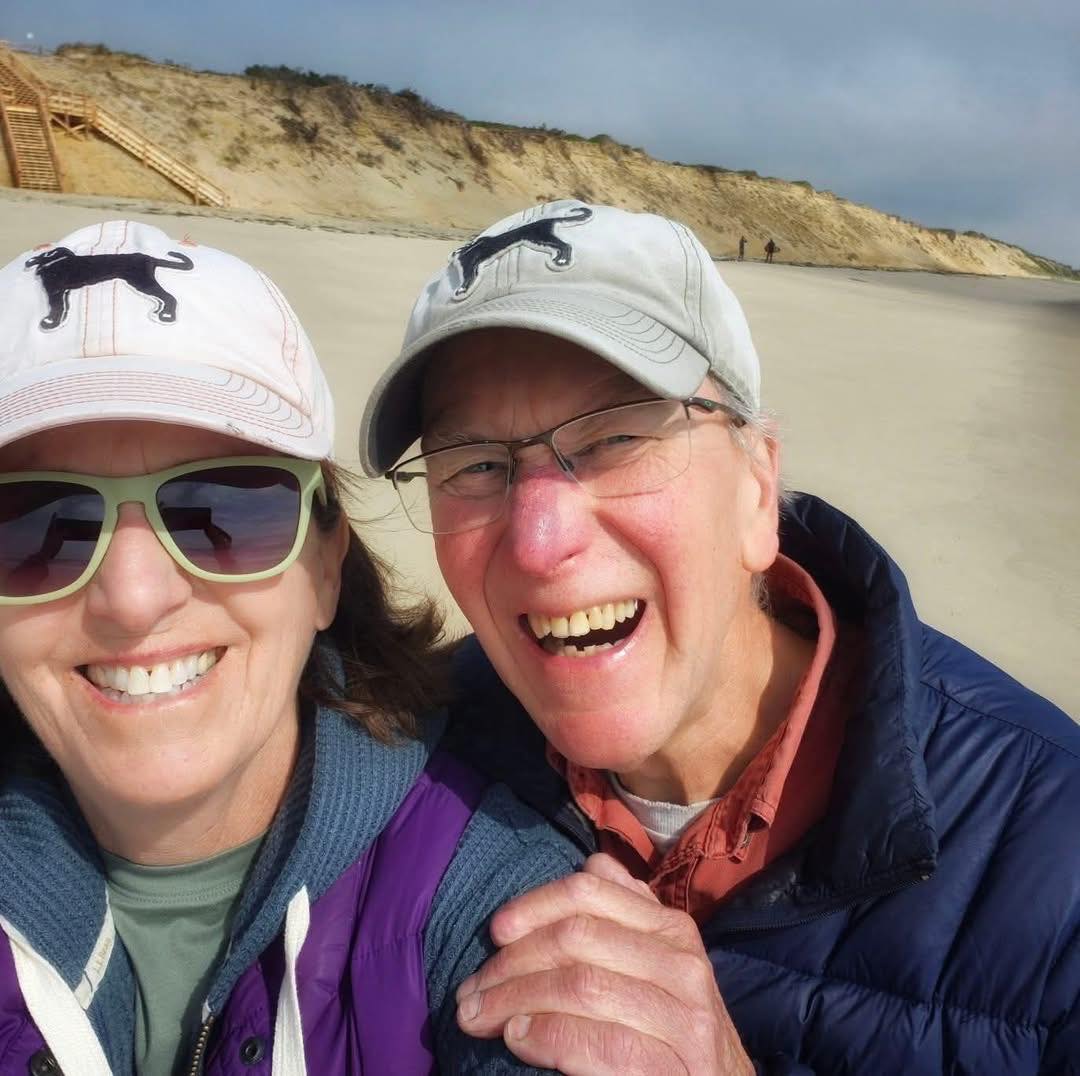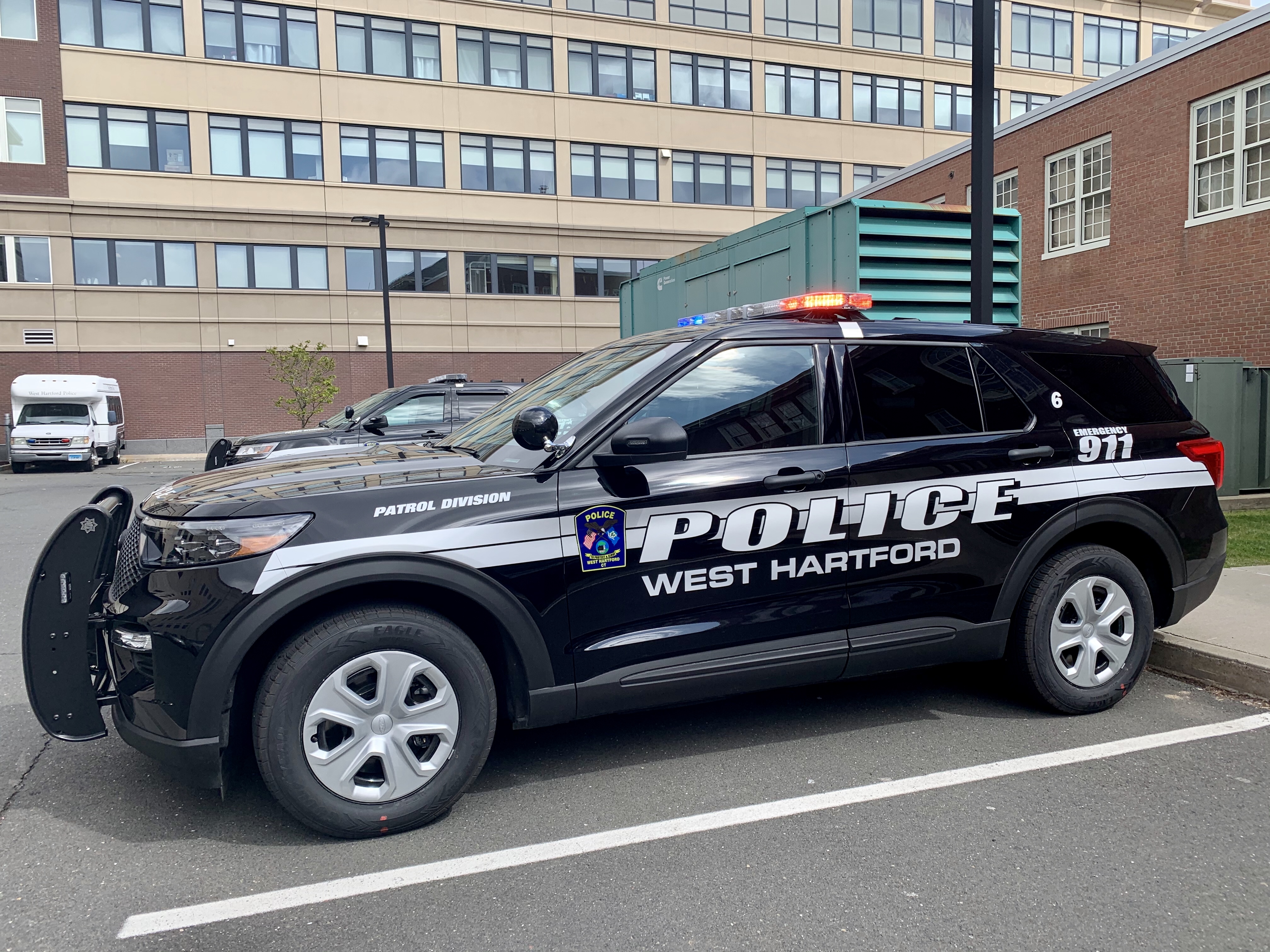Speakers Deliver Powerful Messages about Servant Leadership at West Hartford’s Martin Luther King Day Celebration

Audio By Carbonatix

Rev. Dr. Shelley Best gave the keynote address at West Hartford's 28th celebration of Martin Luther King Day. Jan. 15, 2024. Photo credit: Ronni Newton
Included in Monday’s program was a tribute to the late Earl Exum and the announcement of the ‘Earl Exum Servant Leader Award’ program.
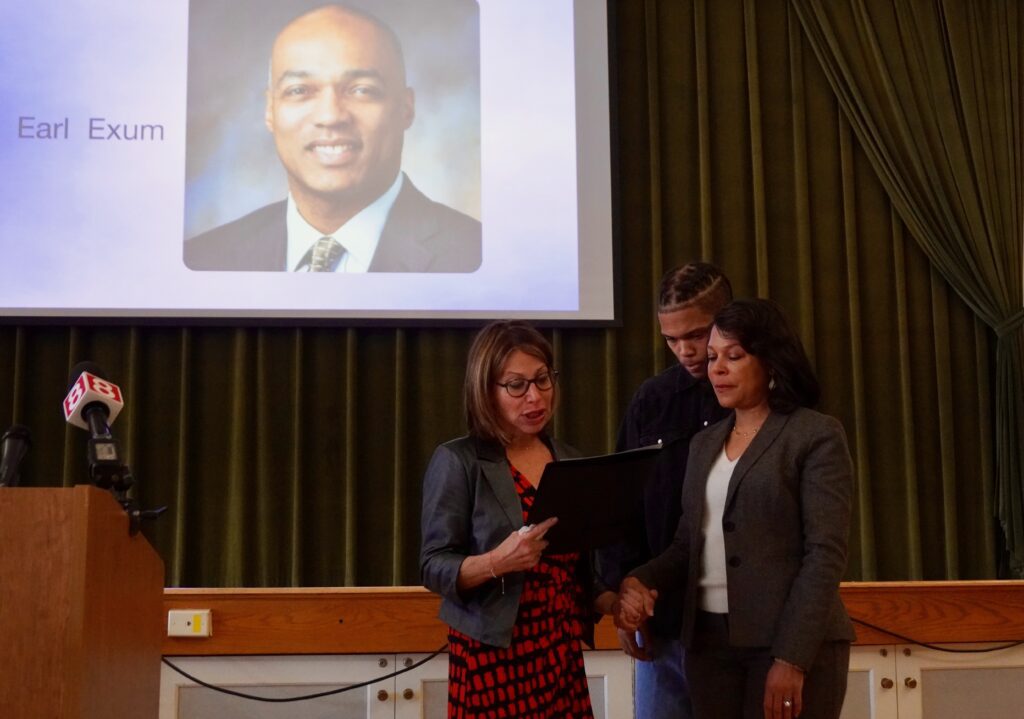
West Hartford Mayor Shari Cantor (left) presents a proclamation to Tammy Exum and her son, Jonathan, announcing the ‘Earl Exum Servant Leader’ award. West Hartford’s 28th celebration of Martin Luther King Day. Jan. 15, 2024. Photo credit: Ronni Newton
By Ronni Newton
A standing-room-only crowd filled the West Hartford Town Hall auditorium on Monday morning, and from beginning to end of the nearly two-hour celebration of the work and life of Dr. Martin Luther King Jr., attendees were inspired by messages about servant leadership, about turning inspiration into action, about love and respect, and about creative disruption.
The theme of this year’s event centered on a speech delivered by King on Feb. 4, 1968, which was an adaptation of the 1952 homily ‘‘Drum-Major Instincts,” and which focused on the human desire to achieve greatness – through drum major-like leadership – but with a different definition of greatness. “Everybody can be great … because anybody can serve. You don’t have to have a college degree to serve. You don’t have to make your subject and verb agree to serve. You only need a heart full of grace. A soul generated by love,” King said in that speech.
Mayor Shari Cantor welcomed the crowd, recognizing elected officials and town leaders in the audience, and wishing everyone “a happy year – a year of finding ways to make others happy.” And on the theme of servant leadership, she pointed out that many town boards and commissions are in need of new members and there was a sign-up table in the back of the room.
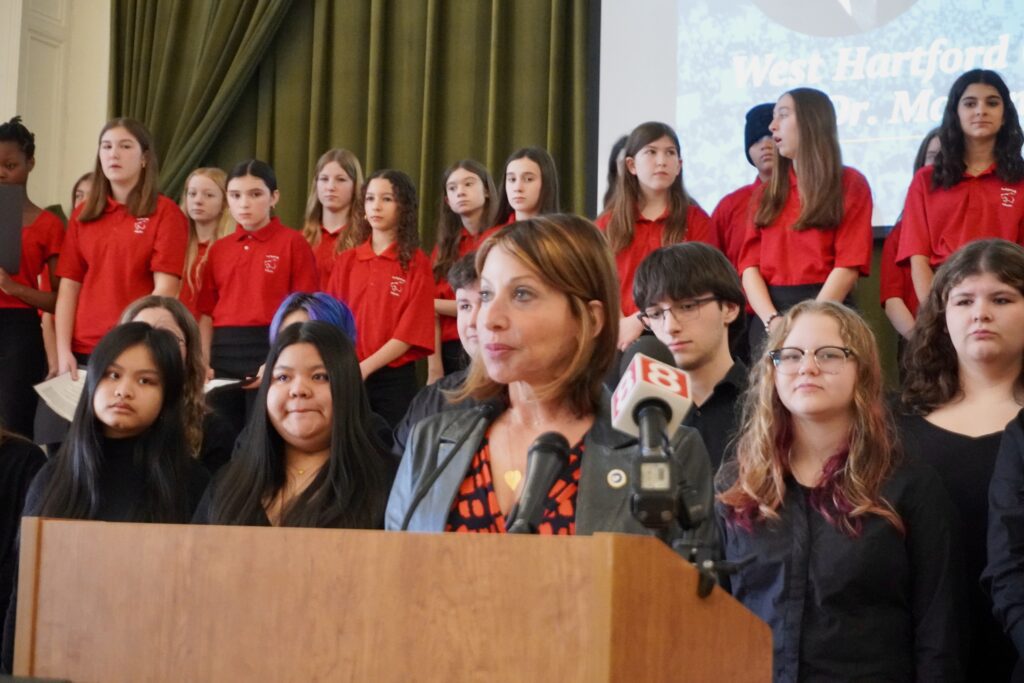
Mayor Shari Cantor welcomes attendees at West Hartford’s 28th celebration of Martin Luther King Day. Jan. 15, 2024. Photo credit: Ronni Newton
“I want to challenge you today to turn your inspiration into action … let your voice be heard,” said Town Council member Carol Blanks, who served as emcee of the event.
Asking the crowd what it means to be a servant leader, Blanks introduced a video with area clergy members answering that question. The video ended with a recording of the late Earl Exum speaking about moving forward and a call to action, effecting “change for the better.”
“Teaching, obligation, love, joy … wealth, community, contribution, but most importantly, as Earl Exum stated, is change. Change. We all must be change leaders,” Blanks said.
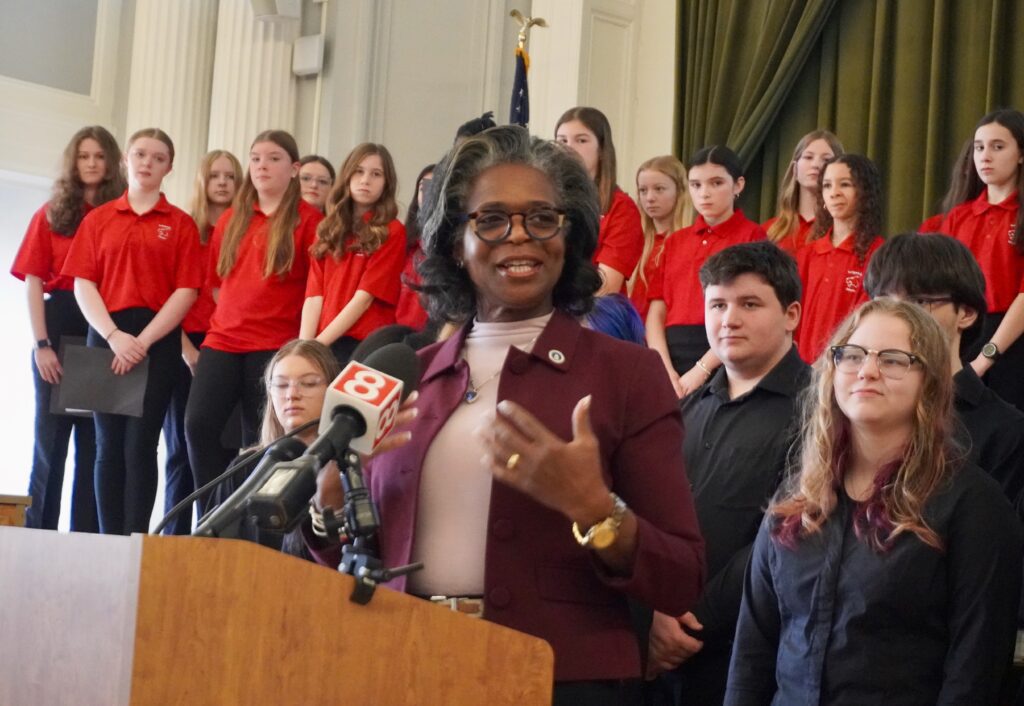
Town Council member Carol Blanks was emcee of West Hartford’s 28th celebration of Martin Luther King Day. Jan. 15, 2024. Photo credit: Ronni Newton
In addition to celebrating Martin Luther King Jr., Monday’s event paid tribute to Exum, a beloved and devoted member of the community who died unexpectedly on Oct. 1, 2023 at age 55. He had been president of WHAASCO (the West Hartford African American Social and Cultural Organization), and Dr. Lynn Thomas of WHAASCO highlighted some of Exum’s change-making efforts, including leading the “successful push to have Connecticut be the first state in the nation to mandate Black and Latino studies into the public school curriculum,” and bringing the Tuskegee Airmen exhibit to the New England Air Museum.
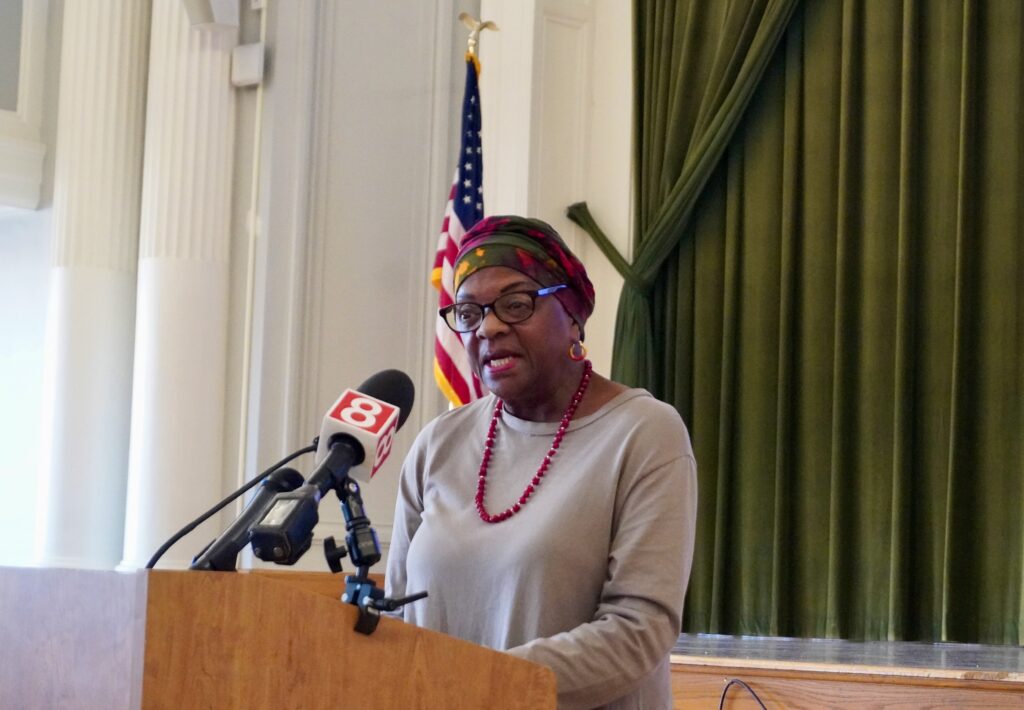
Lynn Thomas of WHAASCO. West Hartford’s 28th celebration of Martin Luther King Day. Jan. 15, 2024. Photo credit: Ronni Newton
“I feel smiled upon at having known Earl Evans Exum,” Thomas said. “I am ever so saddened by his passing but I am buoyed by the knowledge that his legacy, through his many accomplishments, his relationships, his motivation and energy, and through his family will live on.”
As she stood holding the hand of Earl’s wife, state Rep. Tammy Exum, and their youngest son, Jonathan, Cantor read a proclamation announcing the creation of the “Earl Exum Servant Leader” award, which beginning next year will be presented annually at the town’s Martin Luther King Day celebration. Earl Exum, who “exuded excellence, leadership, and compassion to all who knew him,” was recognized Monday as the first recipient of the award.
U.S. Sen. Richard Blumenthal is a regular participant in the town’s Martin Luther King Day celebration, and said he likes coming to West Hartford’s event. “There’s always a crowd here that looks like Martin Luther King’s America,” he said – people of different races, religions, ages.
As for his report about Washington, Blumenthal said the news is dangerous. “It isn’t just the threat to roll back the progress we have made,” he said, “but also that hatred and division are so rampant.”
King was a man of non-violence, and that’s a lesson that needs to be continued, Blumenthal said, noting that he is hopeful because of the many good people, “most especially again young people who are committee to drive out hate.”
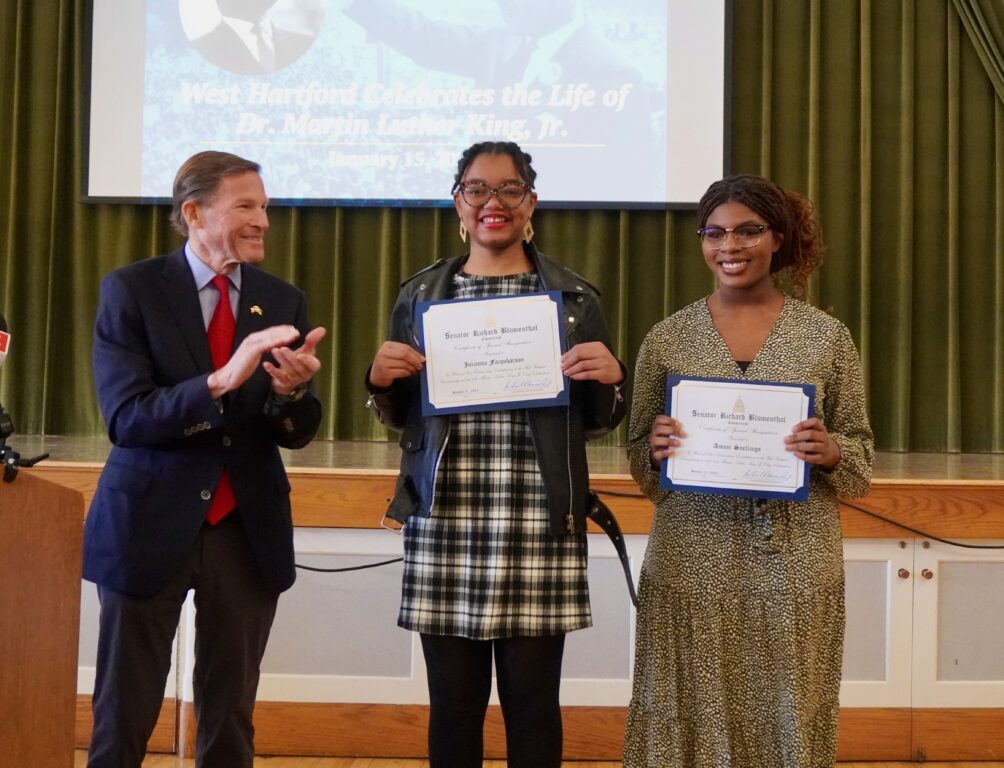
U.S. Sen.Richard Blumenthal presented certificates to Amani Snellings (left) of Hall High School and Julianna Farquharson of Conard High School. West Hartford’s 28th celebration of Martin Luther King Day. Jan. 15, 2024. Photo credit: Ronni Newton
Blumenthal presented certificates of special recognition from the U.S. Senate to two of those young people – student speakers Julianna Farquharson of Conard High School and Amani Snellings of Hall High School, who had been chosen to present their perspectives at the event.
Farquharson spoke specifically of the drum major’s instinct, noting that according to King, to be a servant leader, “all you need is a heart for grace and a soul generated by love,” she said. That leadership can take place anywhere, including as a parent. “Just be sure to lead with peace and righteousness wherever you go,” she added.
Farquharson also shared a personal story from her preschool days – illustrating the point that children closely pay attention to the behavior of adults.
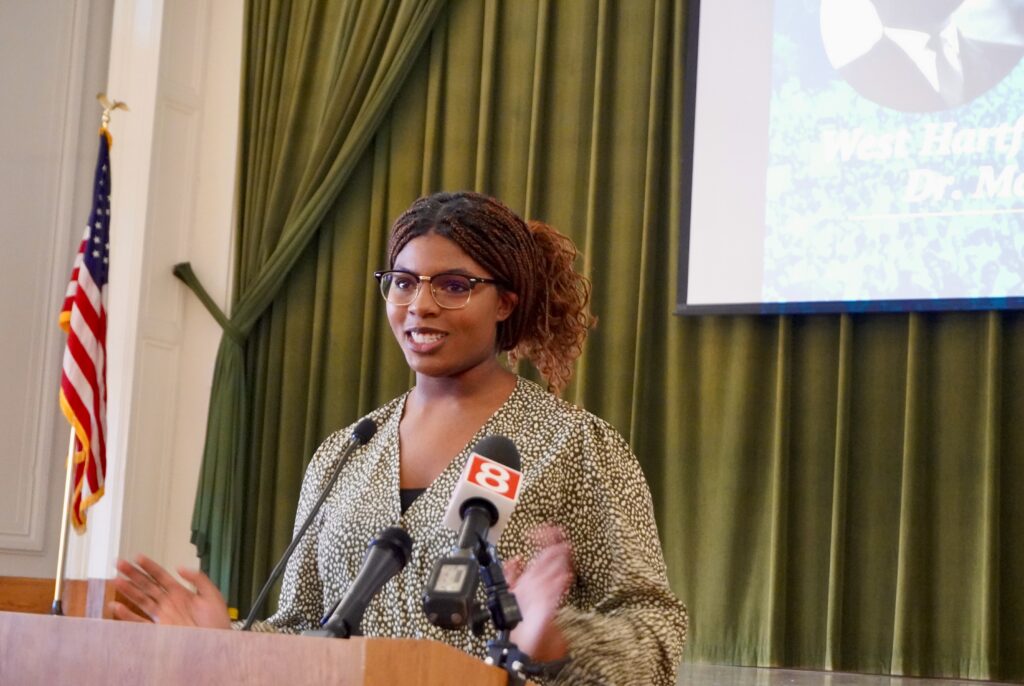
Julianna Farquharson of Conard High School shared a student perspective at West Hartford’s 28th celebration of Martin Luther King Day. Jan. 15, 2024. Photo credit: Ronni Newton
“One day I ran out from the classroom to play with my friends during recess, as we would always do. They were all huddled together in a group, whispering about me when I approached them. When I asked them if they wanted to play tag, one of them told me that they couldn’t play with me ‘because I was Black.’ I hadn’t had any racial discrimination conversations with my parents up until that point, granted I was only 3 or 4. I remember my eyes burning with tears as I ran to tell a teacher,” she said.
It’s an incident she’s never forgotten, Farquharson said, and she firmly believes that a 3-year-old didn’t come up with the idea on their own.
“This is why conversations on race are so important within schools,” said Farquharson. “To put it simply, if kids are old enough to experience discrimination at school and in life, they are old enough to learn about it in the classroom. I did take that negative experience and turned it into a positive one, being assured of my own worth and capabilities by my parents. I was also lucky to have trusted adults at my school that I was able to go to. They made sure to not sweep this incident under the rug and took immediate action.”
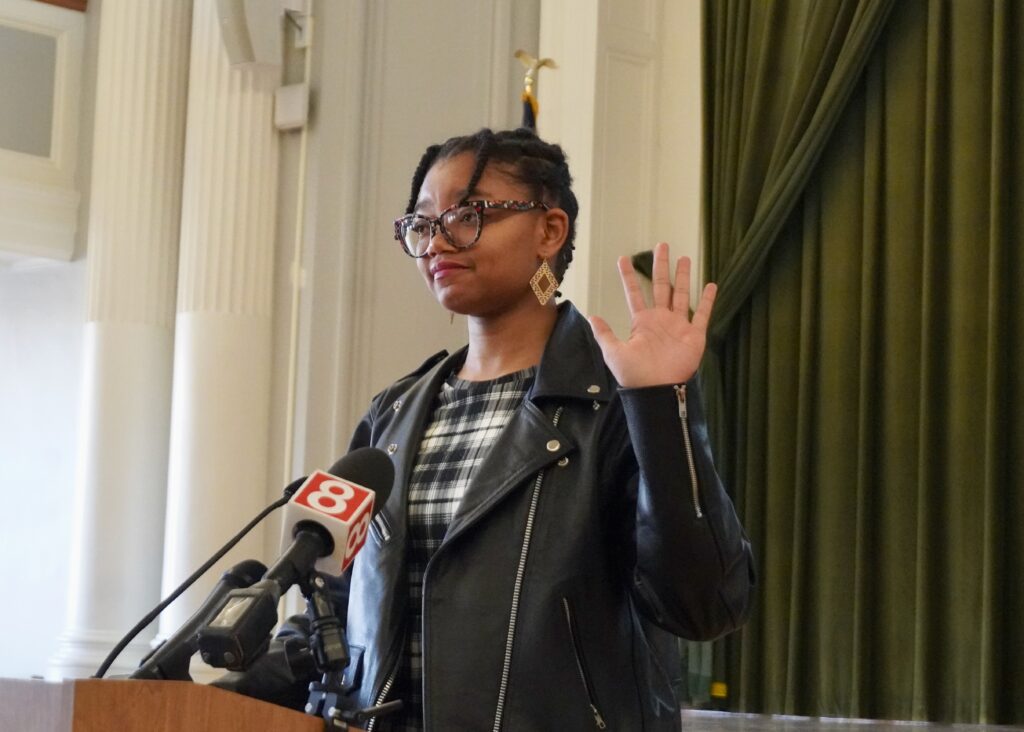
Amani Smellings of Hall High School shared a student perspective at West Hartford’s 28th celebration of Martin Luther King Day. Jan. 15, 2024. Photo credit: Ronni Newton
Snellings began her speech with an exercise, asking the audience – other than those sitting in the front row – to close their eyes as she held several fingers in the air. When she told everyone to open their eyes she was holding up five fingers, and she asked people to guess how many she had been holding up while their eyes were closed. Most guessed five – which was incorrect because until that final moment she had held up one, then two, then three, then four fingers.
What about the bystanders in this analogy, she said, those who were told to look away? “Just because you don’t know something has happened, or is happening doesn’t make it less real,” she said. The problem will still be there, even if you ignore it.
“The first step to solving any problem is to acknowledge that it exists,” she said.
Today is a day of action, Snellings said, and she urged the audience to experience Black art by watching a movie, reading a book, listening to an album. “All things you ordinarily do. The challenge is to do it intentionally. Think critically. Ask questions. Look things up,” and watch the ripples those choices create.
“In his drum major instincts speech, Dr. King said that he who has grace among you can be a servant. That’s the new definition of greatness,” she said, “and because of that anyone can be great.” That, she said, is how to serve the community.
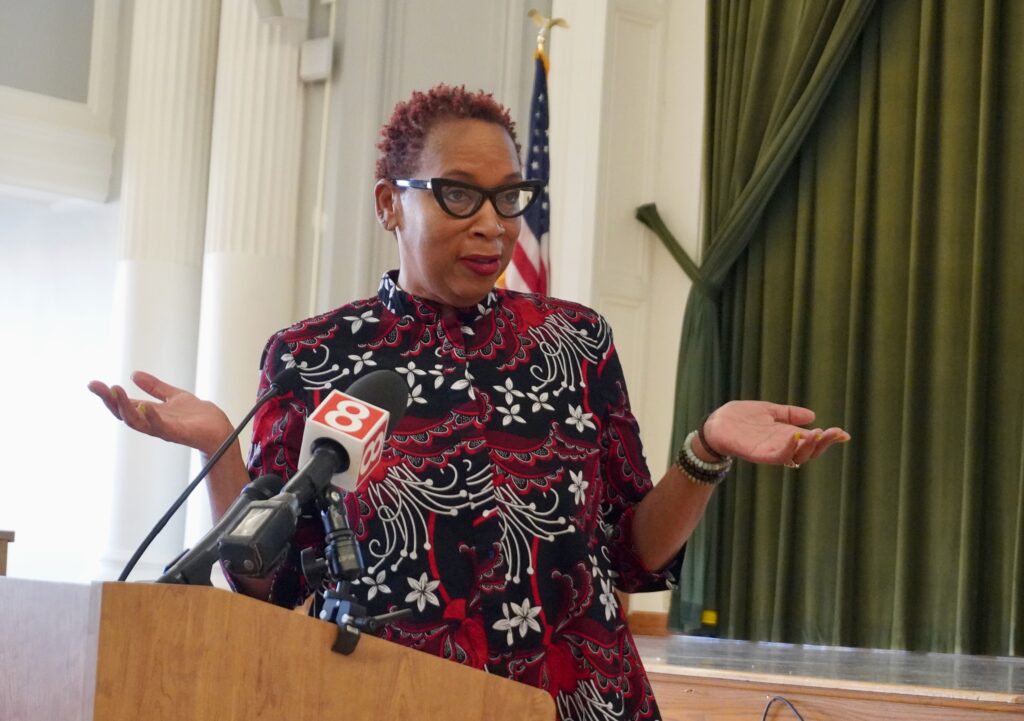
Rev. Dr. Shelley Best gave the keynote address at West Hartford’s 28th celebration of Martin Luther King Day. Jan. 15, 2024. Photo credit: Ronni Newton
The final speech of the day was from Rev. Dr. Shelley Best, CEO of the Greater Hartford Arts Council. A self-proclaimed “creative disruptor,” she began by asking the audience to center themselves “and be here now” by closing their eyes and focusing on their breathing.
She repeated several phrases: “May all people be peaceful. May all people be happy. May all people be safe. May all people be free.” And then she asked the audience to repeat the following with her “in their souls”: “May I be peaceful. May I be happy. May I be safe. May I live free,” she said.
“You have just. been enrolled as a peaceful changemaker,” Best said, but unless that change takes place peacefully, “we will not have change that matters.”
Best called for people to be “creative disruptors,” to love. Some people are hostile and bristly, she said, “because they don’t even really like themselves.”
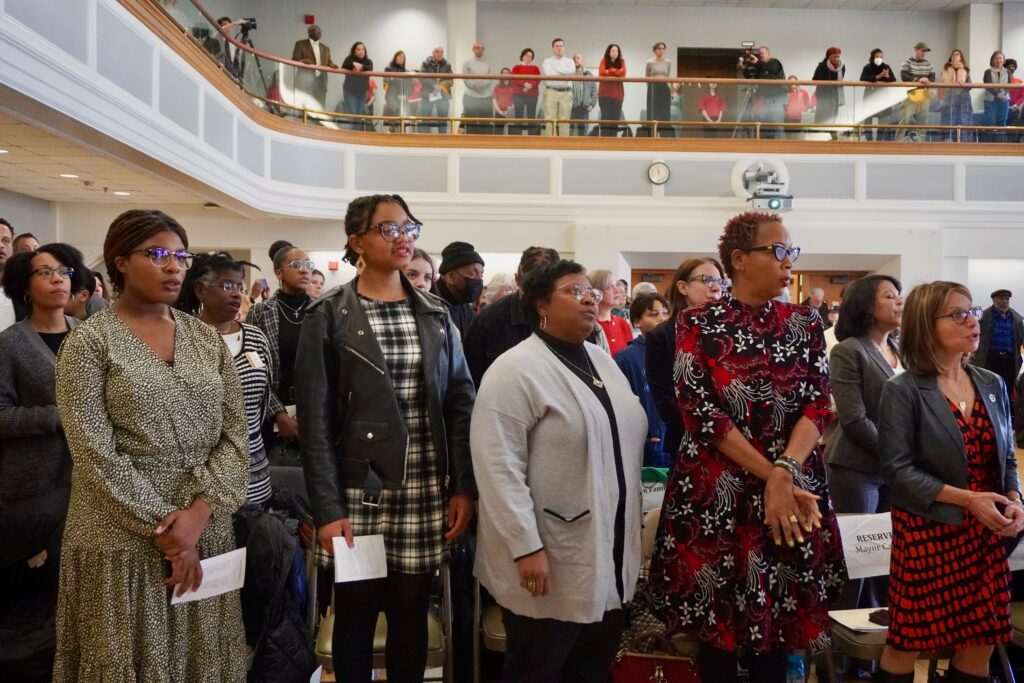
West Hartford’s 28th celebration of Martin Luther King Day. Jan. 15, 2024. Photo credit: Ronni Newton
Best said her father was an activist and a “dreamer” who grew up in Harlem. He “decided the family was going to live integration by having our family integrate a small Connecticut. In the 50s. In the 60s.”
His belief was that the way to integrate the community was to do it with love. They moved to Norfolk, Connecticut, in the northwest corner of the state.
Best said she was born in 1962. As a child, she said, “my brownness was so profound that I would almost stop traffic in Norfolk, CT.” She said she understands very well what what it’s like “to be an ‘other.'”
Part of the legacy of Martin Luther King is to treat people the way you want to be treated, and she knew that no matter what, she needed to show love and kindness, to be a changemaker.
“I was ‘othered,'” Best said, not invited to birthday parties, and if she was invited to someone’s house she had to ask which door she should use. She was the one who got the “skunk valentines” in elementary school.
Best said to be a changemaker, it’s important to be in it for the long haul, “because change does not come instantly,” and it’s also important to understand that “we’re all in this together” and are impacted by the injustice and cruelty happening worldwide as people are becoming divorced from humanity.
“At the heart of this is a respect and honoring of all human beings,” Best said. “Creative disruption is important because we need to do something to change people’s minds … but the way people actually change is through relationships.” Once you form a relationship, she said, “suddenly they’re not an ‘other,’ they’re just a friend.”
Best is committed to art as an important means of facilitating inclusivity and equity. She noted the Martin Luther King mural by Corey Pane on the side of the Noah Webster library, and said that art makes people pay attention in different ways.
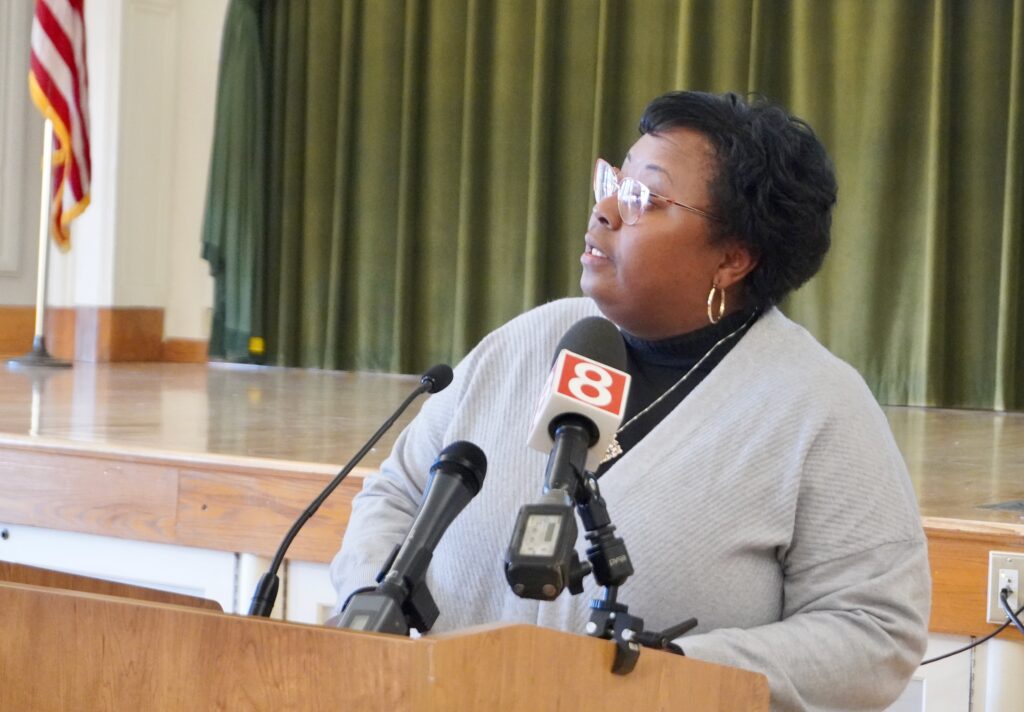
Rev. Rowena Kemp of Grace Episcopal Church in Hartford gave the invocation at West Hartford’s 28th celebration of Martin Luther King Day. Jan. 15, 2024. Photo credit: Ronni Newton
Rev. Rowena Kemp of Grace Episcopal Church in Hartford delivered the invocation.
The Hall High School Jazz Combo provided the opening music, and other musical performances included Sedgwick Sounds and Conard High School’s Voices of the World joining together for “Lift Ev’ry Voice and Sing” (the Black National Anthem), several pieces by Sedgwick Sounds, and the traditional communal singing of “We Shall Overcome” to close the program.
The entire ceremony can be viewed on the West Hartford Community Interactive YouTube channel.
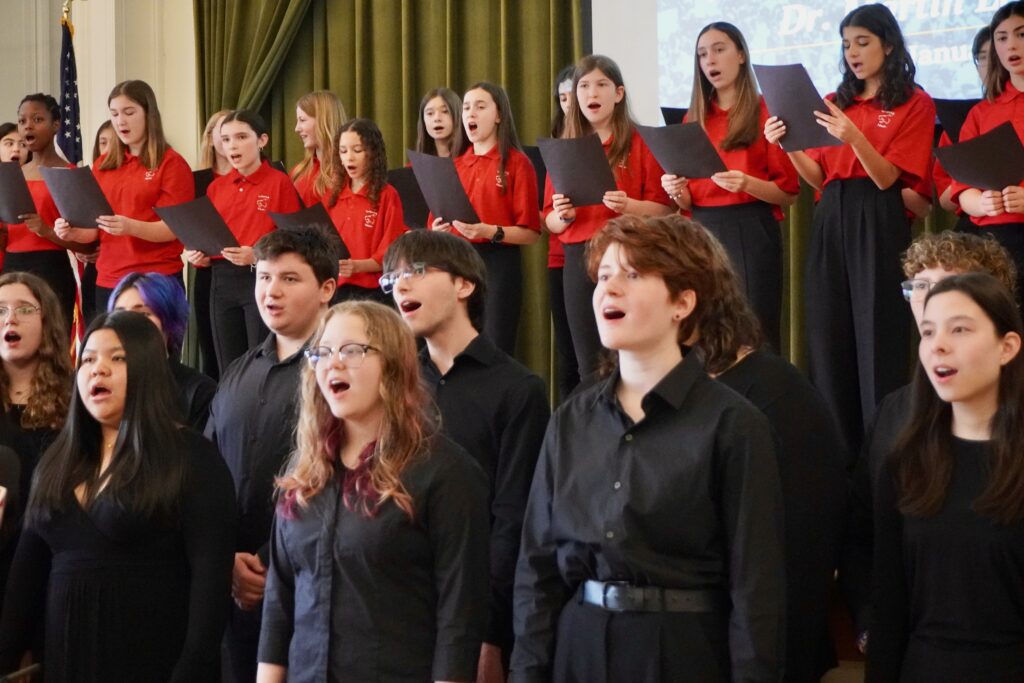
Combined Sedgwick Sounds and Conard’s Voices of the World at West Hartford’s 28th celebration of Martin Luther King Day. Jan. 15, 2024. Photo credit: Ronni Newton
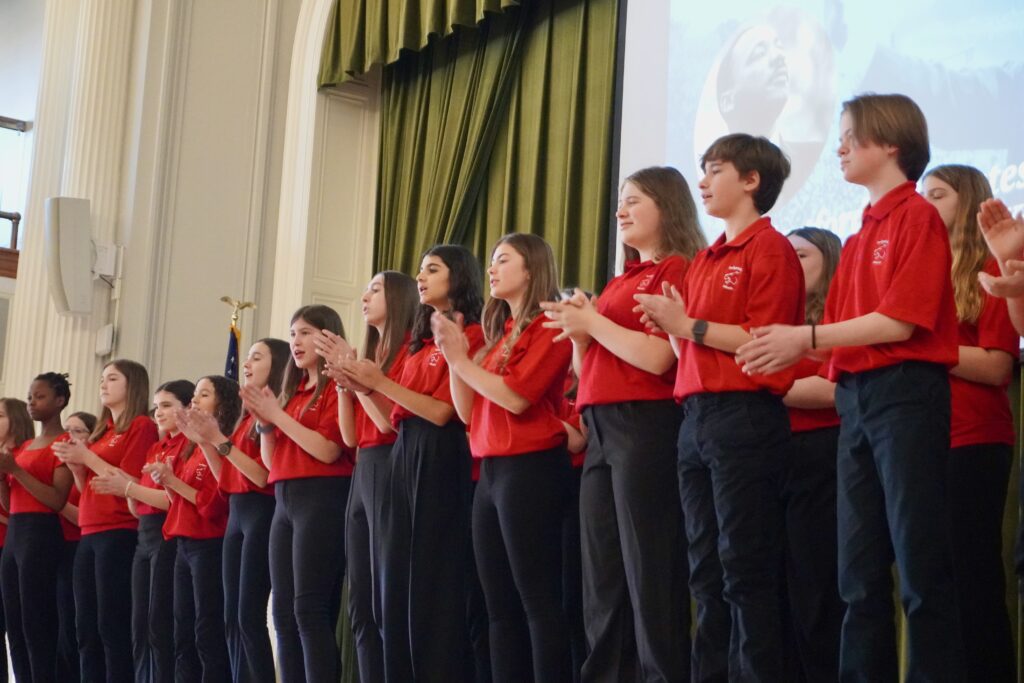
Sedgwick Sounds performs at West Hartford’s 28th celebration of Martin Luther King Day. Jan. 15, 2024. Photo credit: Ronni Newton
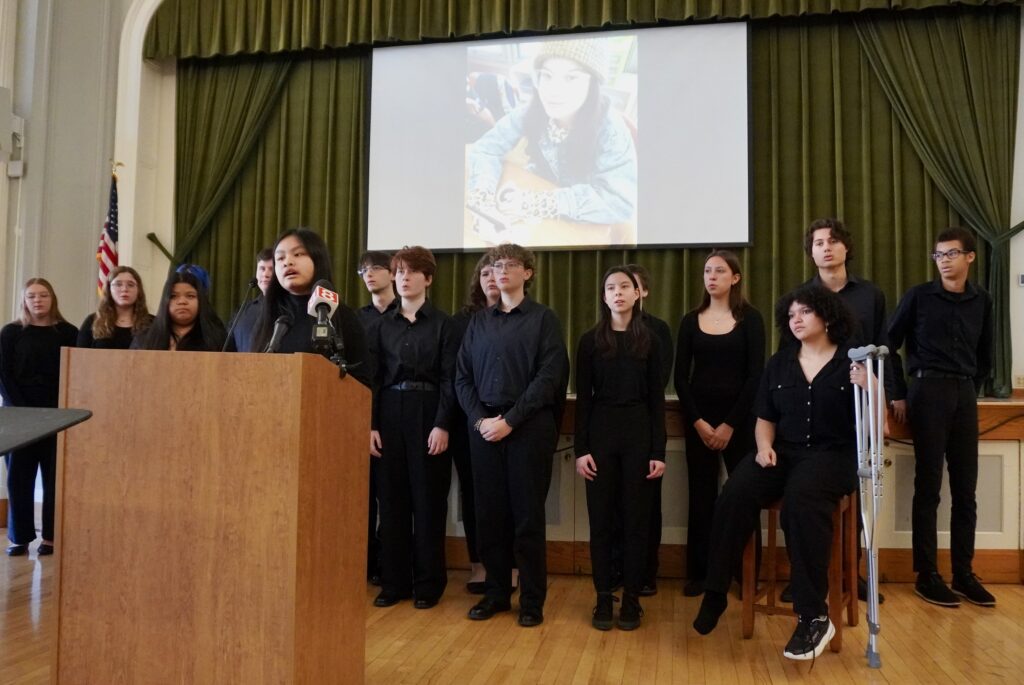
Conard Voices of the World Choir performs at West Hartford’s 28th celebration of Martin Luther King Day. Jan. 15, 2024. Photo credit: Ronni Newton
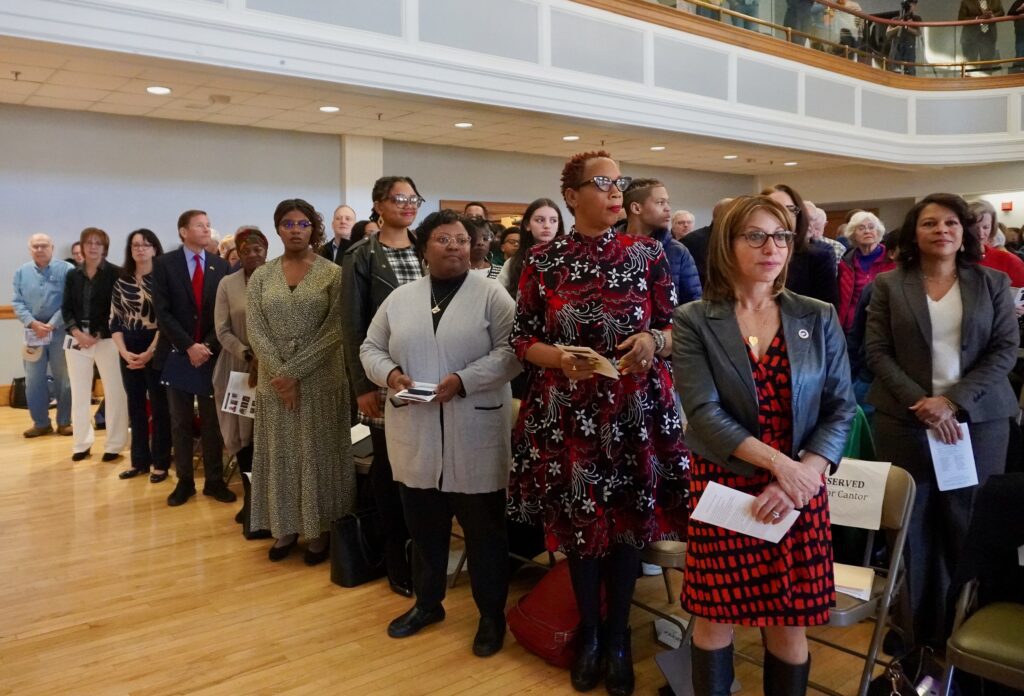
West Hartford’s 28th celebration of Martin Luther King Day. Jan. 15, 2024. Photo credit: Ronni Newton
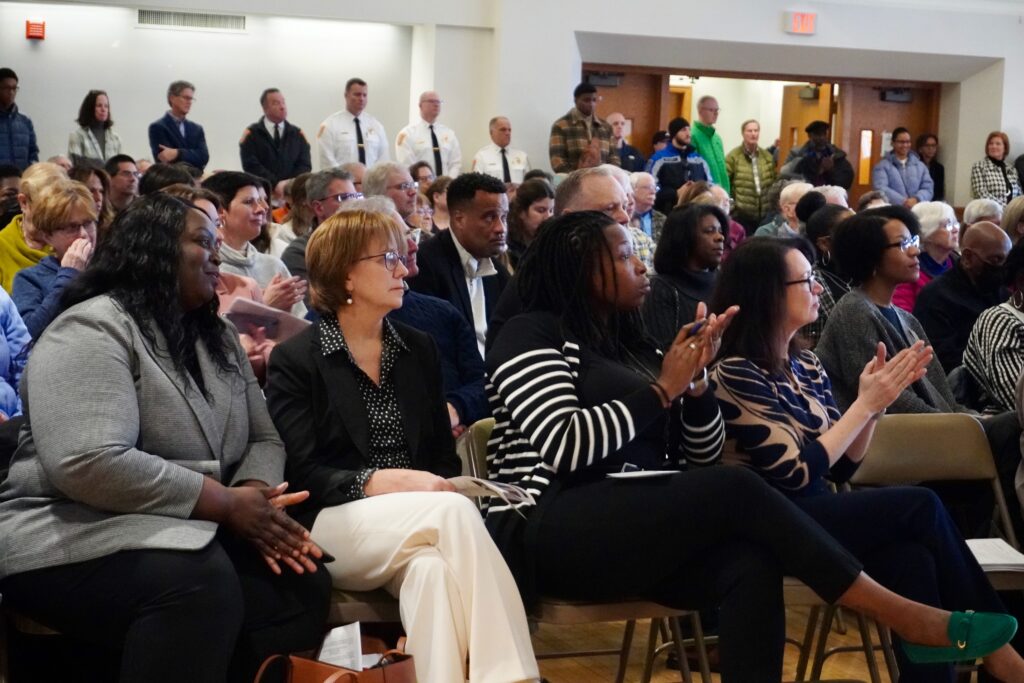
West Hartford’s 28th celebration of Martin Luther King Day. Jan. 15, 2024. Photo credit: Ronni Newton
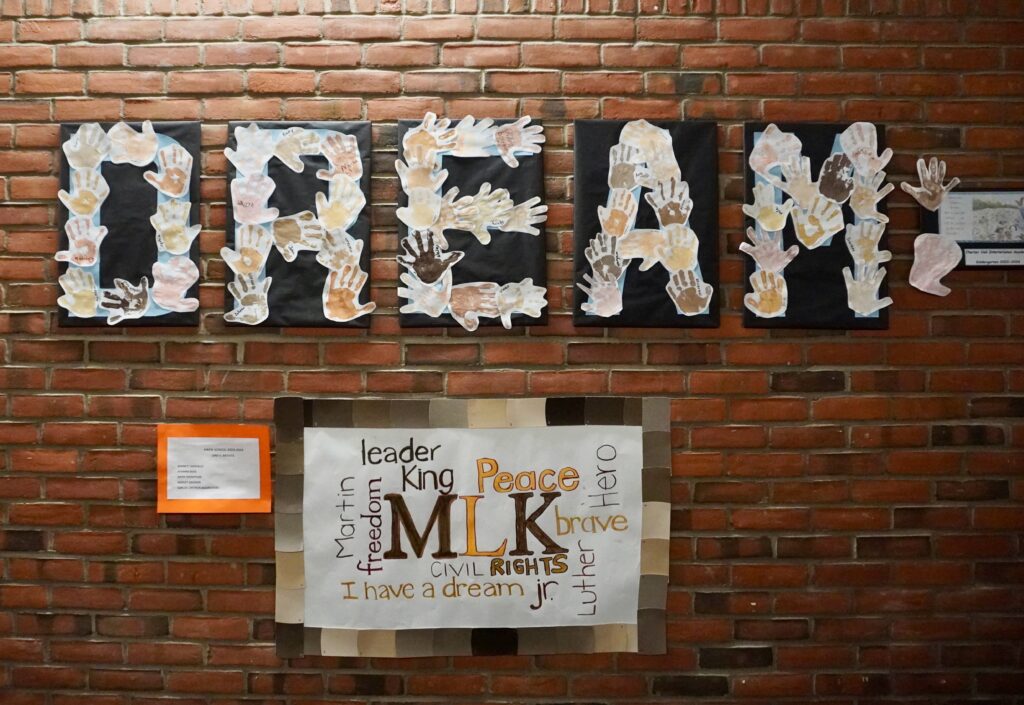
Artwork by West Hartford Public Schools elementary students on display at West Hartford’s 28th celebration of Martin Luther King Day. Jan. 15, 2024. Photo credit: Ronni Newton
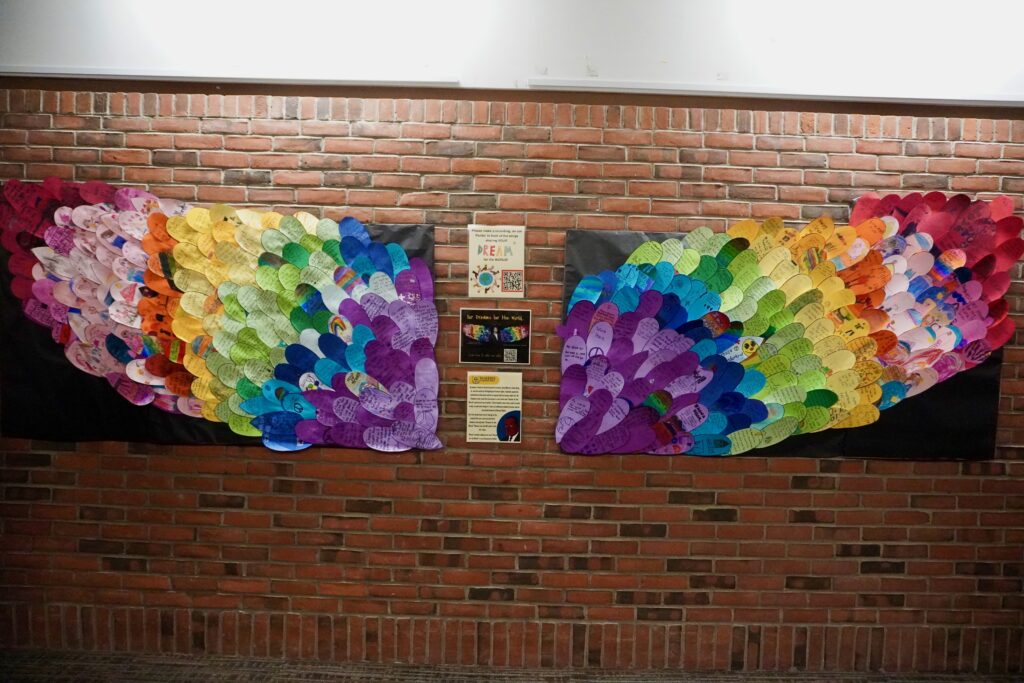
Artwork by West Hartford Public Schools elementary students on display at West Hartford’s 28th celebration of Martin Luther King Day. Jan. 15, 2024. Photo credit: Ronni Newton
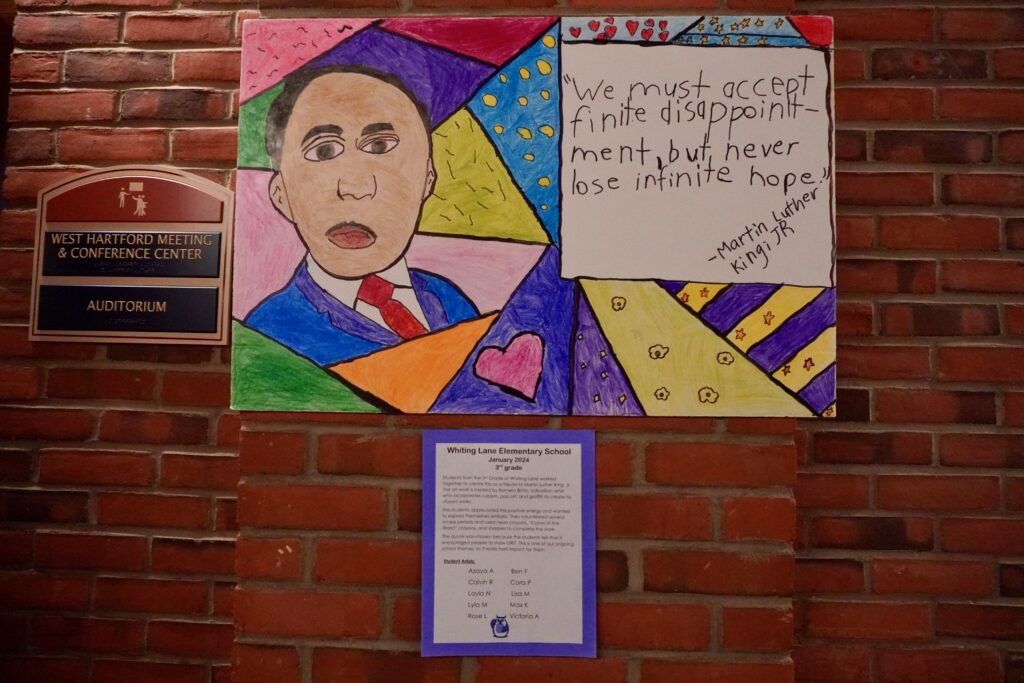
Artwork by West Hartford Public Schools elementary students on display at West Hartford’s 28th celebration of Martin Luther King Day. Jan. 15, 2024. Photo credit: Ronni Newton
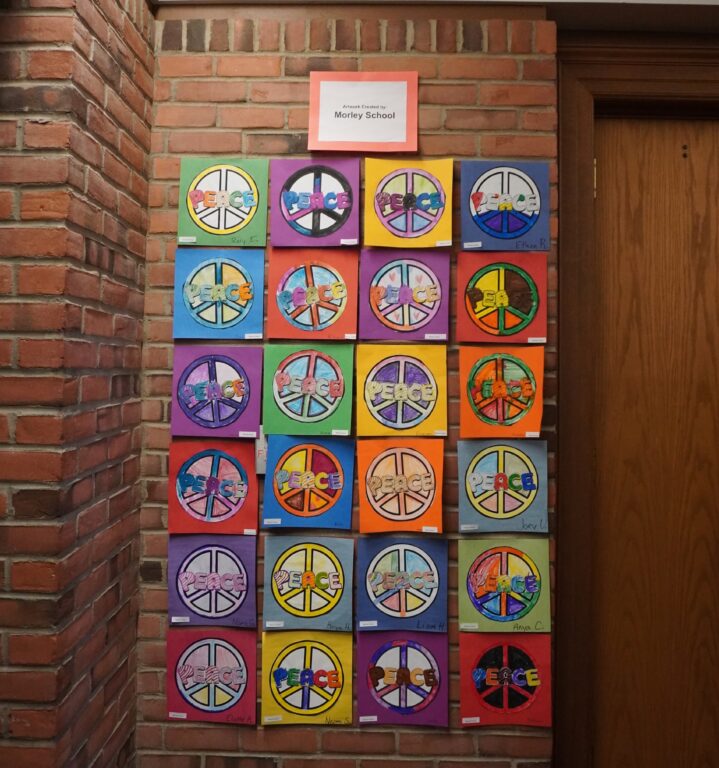
Artwork by West Hartford Public Schools elementary students on display at West Hartford’s 28th celebration of Martin Luther King Day. Jan. 15, 2024. Photo credit: Ronni Newton
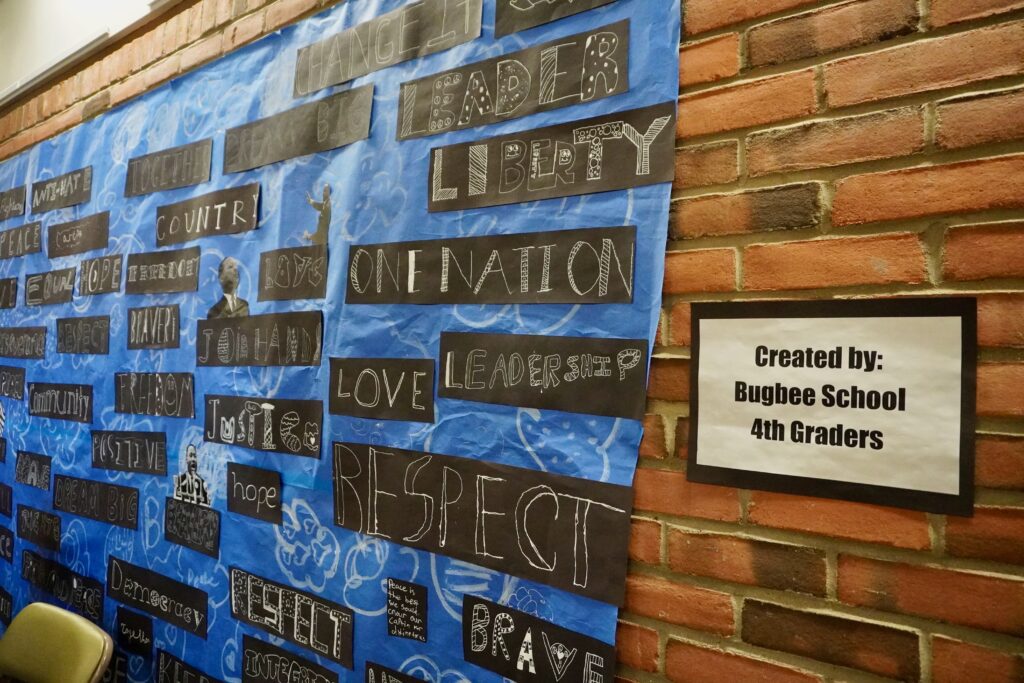
Artwork by West Hartford Public Schools elementary students on display at West Hartford’s 28th celebration of Martin Luther King Day. Jan. 15, 2024. Photo credit: Ronni Newton
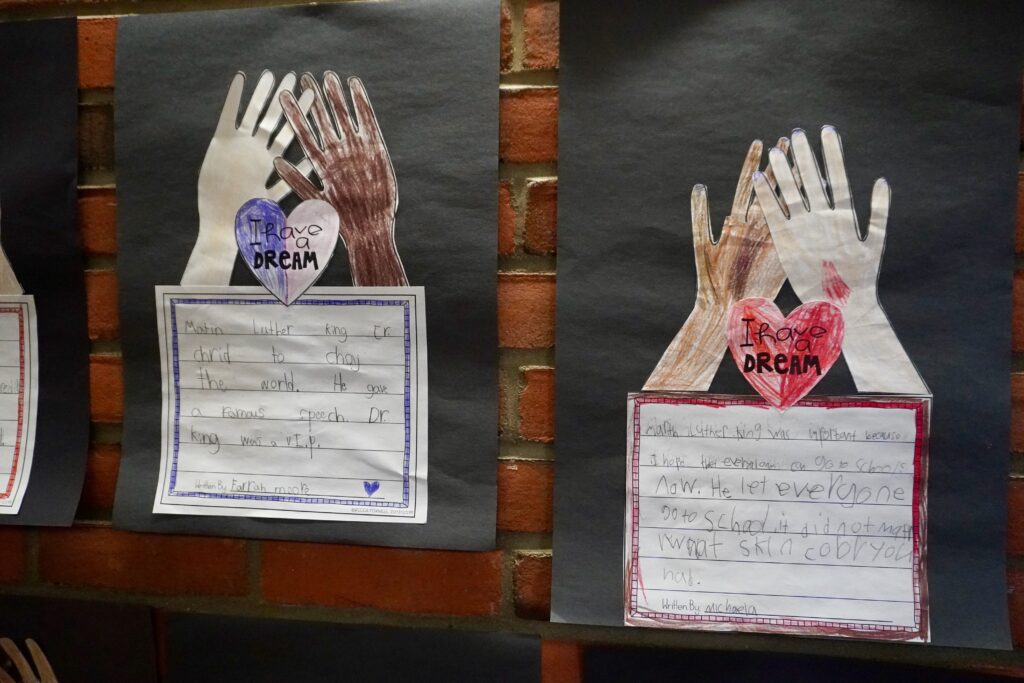
Artwork by West Hartford Public Schools elementary students on display at West Hartford’s 28th celebration of Martin Luther King Day. Jan. 15, 2024. Photo credit: Ronni Newton

Artwork by West Hartford Public Schools elementary students on display at West Hartford’s 28th celebration of Martin Luther King Day. Jan. 15, 2024. Photo credit: Ronni Newton
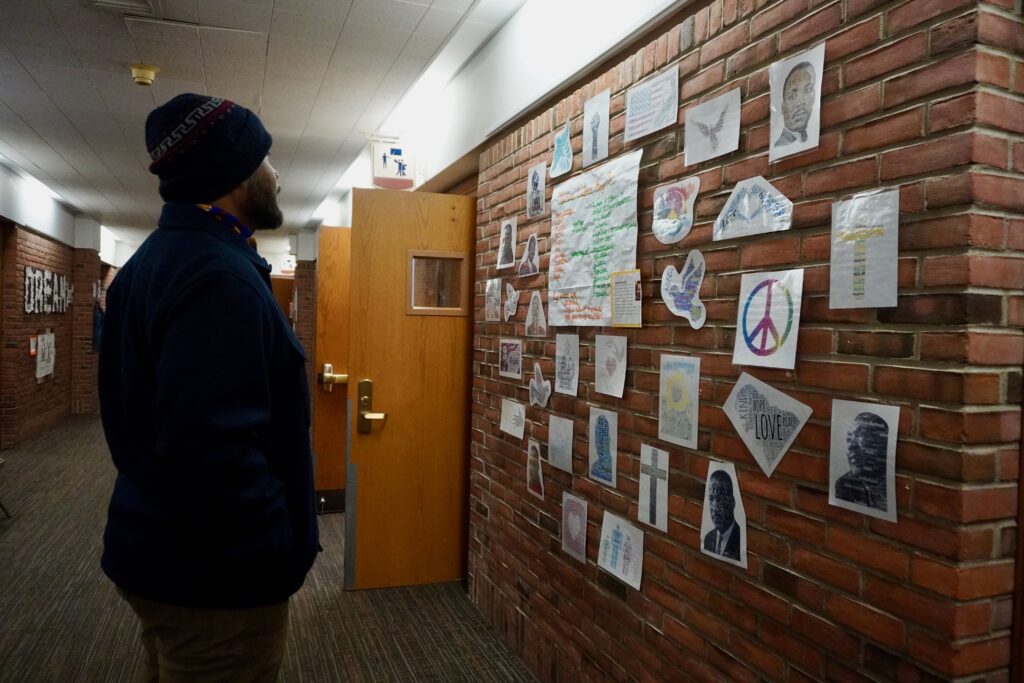
Artwork by West Hartford Public Schools elementary students on display at West Hartford’s 28th celebration of Martin Luther King Day. Jan. 15, 2024. Photo credit: Ronni Newton
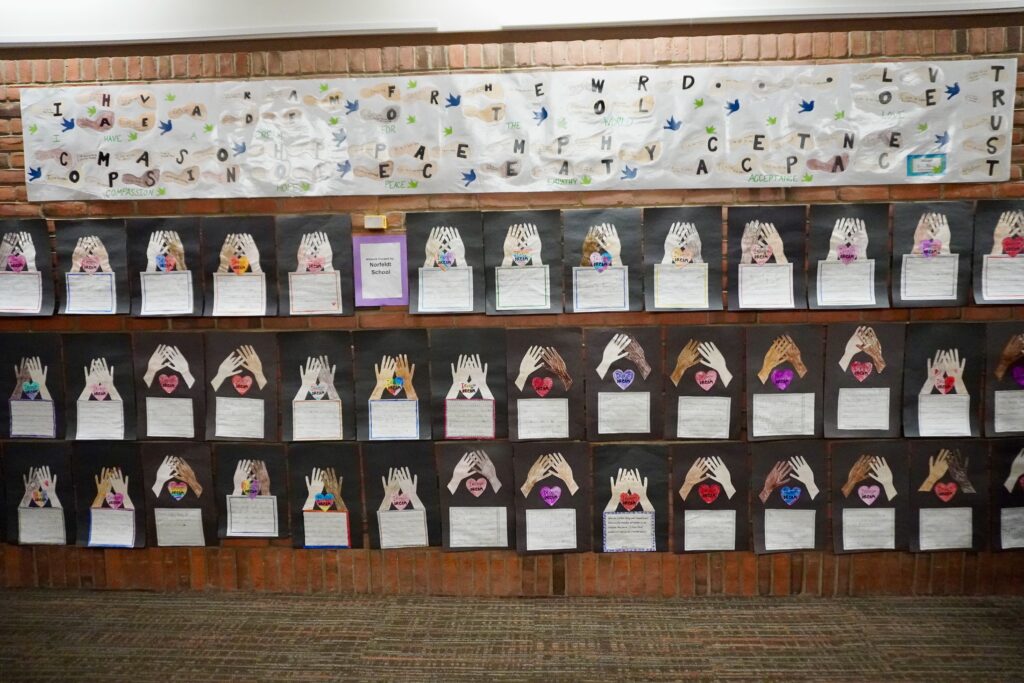
Artwork by West Hartford Public Schools elementary students on display at West Hartford’s 28th celebration of Martin Luther King Day. Jan. 15, 2024. Photo credit: Ronni Newton
Like what you see here? Click here to subscribe to We-Ha’s newsletter so you’ll always be in the know about what’s happening in West Hartford! Click the blue button below to become a supporter of We-Ha.com and our efforts to continue producing quality journalism.


